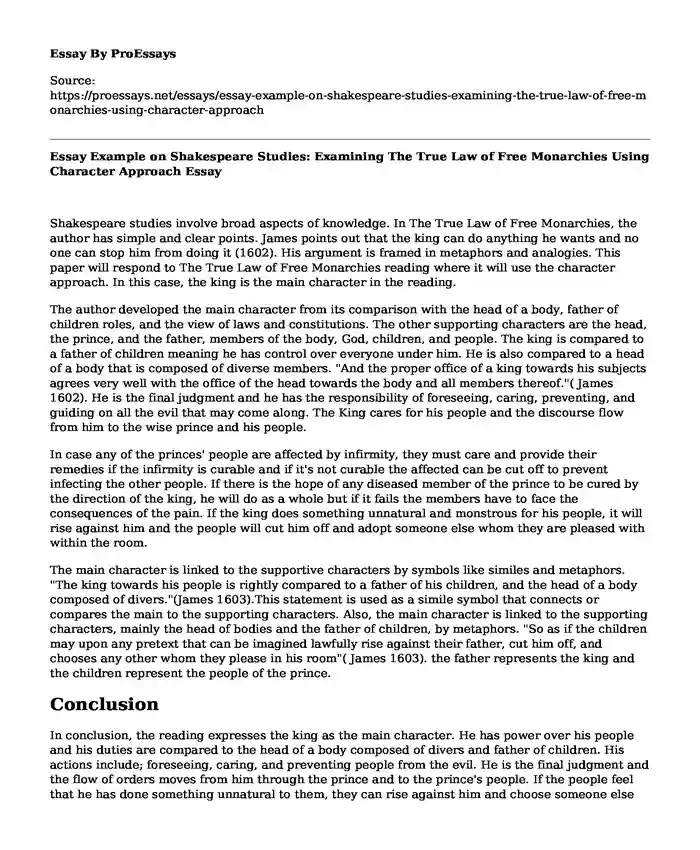Shakespeare studies involve broad aspects of knowledge. In The True Law of Free Monarchies, the author has simple and clear points. James points out that the king can do anything he wants and no one can stop him from doing it (1602). His argument is framed in metaphors and analogies. This paper will respond to The True Law of Free Monarchies reading where it will use the character approach. In this case, the king is the main character in the reading.
The author developed the main character from its comparison with the head of a body, father of children roles, and the view of laws and constitutions. The other supporting characters are the head, the prince, and the father, members of the body, God, children, and people. The king is compared to a father of children meaning he has control over everyone under him. He is also compared to a head of a body that is composed of diverse members. "And the proper office of a king towards his subjects agrees very well with the office of the head towards the body and all members thereof."( James 1602). He is the final judgment and he has the responsibility of foreseeing, caring, preventing, and guiding on all the evil that may come along. The King cares for his people and the discourse flow from him to the wise prince and his people.
In case any of the princes' people are affected by infirmity, they must care and provide their remedies if the infirmity is curable and if it's not curable the affected can be cut off to prevent infecting the other people. If there is the hope of any diseased member of the prince to be cured by the direction of the king, he will do as a whole but if it fails the members have to face the consequences of the pain. If the king does something unnatural and monstrous for his people, it will rise against him and the people will cut him off and adopt someone else whom they are pleased with within the room.
The main character is linked to the supportive characters by symbols like similes and metaphors. "The king towards his people is rightly compared to a father of his children, and the head of a body composed of divers."(James 1603).This statement is used as a simile symbol that connects or compares the main to the supporting characters. Also, the main character is linked to the supporting characters, mainly the head of bodies and the father of children, by metaphors. "So as if the children may upon any pretext that can be imagined lawfully rise against their father, cut him off, and chooses any other whom they please in his room"( James 1603). the father represents the king and the children represent the people of the prince.
Conclusion
In conclusion, the reading expresses the king as the main character. He has power over his people and his duties are compared to the head of a body composed of divers and father of children. His actions include; foreseeing, caring, and preventing people from the evil. He is the final judgment and the flow of orders moves from him through the prince and to the prince's people. If the people feel that he has done something unnatural to them, they can rise against him and choose someone else who pleases them.
Work Cited
James, I. "True Law of Free Monarchies (1598)." TANNER, JR Constitutional Documents of the Reign of James I: 1602-1625. https://scholarship.law.georgetown.edu/cgi/viewcontent.cgi?article=1676&context=facpub
Cite this page
Essay Example on Shakespeare Studies: Examining The True Law of Free Monarchies Using Character Approach. (2023, Jul 02). Retrieved from https://proessays.net/essays/essay-example-on-shakespeare-studies-examining-the-true-law-of-free-monarchies-using-character-approach
If you are the original author of this essay and no longer wish to have it published on the ProEssays website, please click below to request its removal:
- Literary Analysis Essay on Hills Like White Elephants by Ernest Hemingway
- Mythology Comparison and Contrast Essay Example
- The Primary Purpose and Conflicts of the Story of an Hour Essay Example
- English Term Paper on American Slave Narrators
- Understanding Ralph Ellison's Invisible Man Paper Example
- Essay Example on Child Narrator: Delivering Stories With Meaning
- A rose for Emily and Sonny's blues Essay







